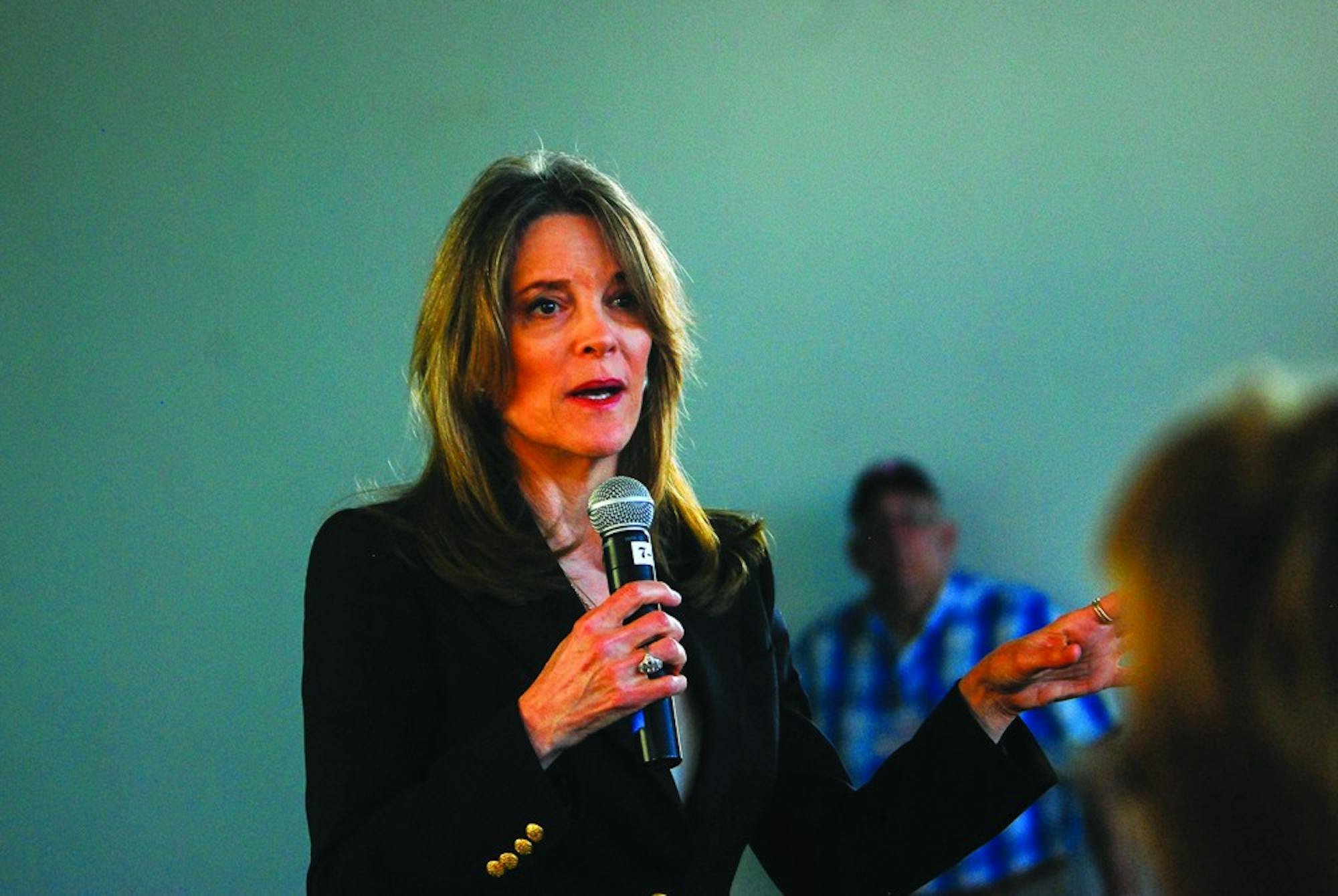Democratic presidential candidate Marianne Williamson spoke to about 50 students and community members at the Top of the Hop Wednesday evening. Williamson’s talk and subsequent question-and-answer session focused on morality and what she described as a need to reshape the American political system.
“The American Revolution has to be an ongoing process,” Williamson said.
Williamson, a self-help author, activist and spiritual advisor to Oprah Winfrey, previously ran a failed campaign as an independent for California’s 33rd congressional district in 2014.
Following an introduction by members of the Dartmouth College Democrats, Williamson said she supported “typical” left-wing, progressive policies. Some of the progressive policies she cited included Medicare for All, making public colleges and universities free for students and raising the federal minimum wage. Williamson also said she plans to turn “love” into a “political force” through her campaign. Williamson called those who decried this concept as unreasonable “naive.”
Williamson attacked what she views as corruption in the United States, calling it “authoritarian corporatism.” The symptoms of this corruption, according to Williamson, include the “opportunistic infection” that is President Donald Trump. She implored the audience to remember that if one’s only goal is to replace the current president in 2020, the larger problem, as well as its root, is being overlooked. Over the course of her speech, Williamson focused on childhood trauma, race and national security.
Regarding chronic childhood trauma, she said that as president she would institute a massive reinvestment of resources into American kids living in what she termed “domestic war zones,” as well as a new executive branch department focused on those in the United States under the age of 18.
The second large issue Williamson addressed was race in America.
“Racism is America’s original character defect,” Williamson said. As president, she said she would institute a system of reparations for descendants of slaves and Native Americans. She recently made headlines for claiming that spending less than $100 billion on reparations would be “an insult.”
Lastly, Williamson highlighted national security. Under this category, she said she would “wage peace,” which would include fighting climate change and stopping the prioritization of profit, specifically calling out defense contractors.
Additionally, she added that “waging peace” would include increasing economic opportunities for women, expanding educational opportunities for children, reducing violence against women and ameliorating unnecessary human suffering wherever possible.
“We’ve gotten into the habit of asking for too little, of expecting too little,” Williamson said.
The “complicit silence” of the American people has perpetuated these problems, according to Williamson.
In response to a question about the recent law passed in New Hampshire that bars most Dartmouth students from voting in the state, Williamson said the law was a form of passive voter suppression and vowed to do everything in her power to aid voting if she were to be elected president, including automatic registration on one’s 18th birthday and a national holiday on election day.
Kelly Zeilman ’22 thought Williamson was different from other presidential candidates and seemed passionate about her message.
“There is a lot of hate in the country right now, and the idea of turning love into a political tool is a good message, but I’m not sure it’s salient enough to run a campaign on,” Zeilman said.
Similarly, Katie Smith ’22 said that “kindness and love and courage and hope and buzzwords are very important, but I don’t think anything can substitute for political experience.”
Emery Rheam ’22, who asked Williamson about her plan to approach climate change, said she was surprised that the candidate had concrete ideas beyond the Green New Deal. Williamson said she would put an environmentalist in charge of the Environmental Protection Agency and make it a magnet for “the most brilliant scientists and sustainability experts.” However, Rheam said that the metaphor Williamson offered with the answer — likening the problem of climate change to the issue of addiction and sobriety — weakened the potency of her response.
“I respect the fact that she’s running, but I’m not for her campaign,” Ellie Baker ’22 said.
As of now, Williamson still needs around 13,300 more new unique donors to qualify for the presidential candidate debates hosted by the Democratic National Convention, the first of which is on June 27. She is not mentioned in most polls, and polls which do include her have her support at less than one percent.
In a nod to New Hampshire’s state motto, Williamson ended her speech with the statement, “We are not living free.”




